Monday Feb 16, 2026
Monday Feb 16, 2026
Thursday, 2 January 2020 01:24 - - {{hitsCtrl.values.hits}}
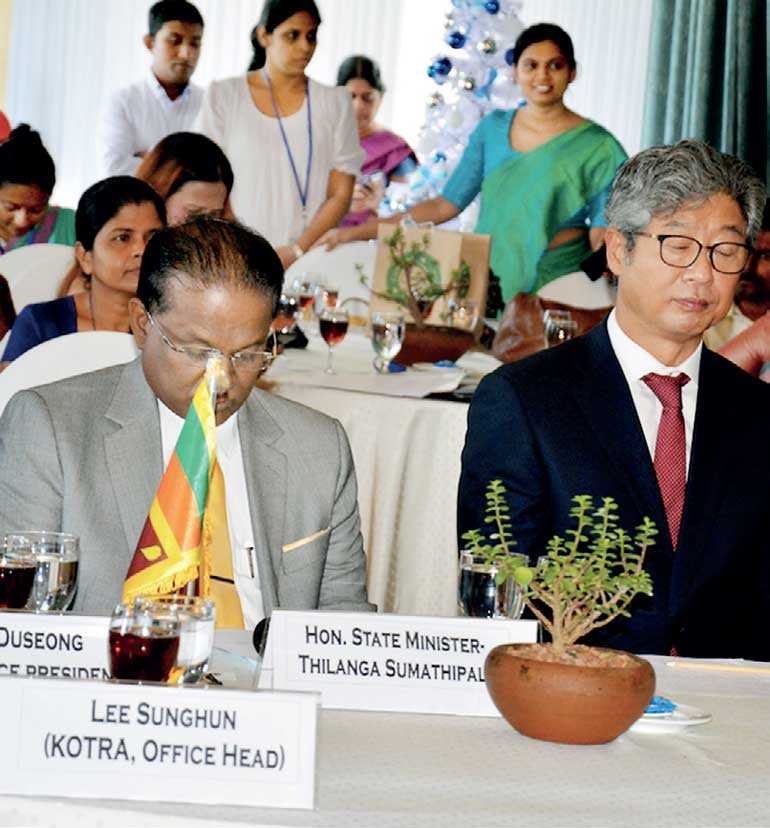
Final ceremony
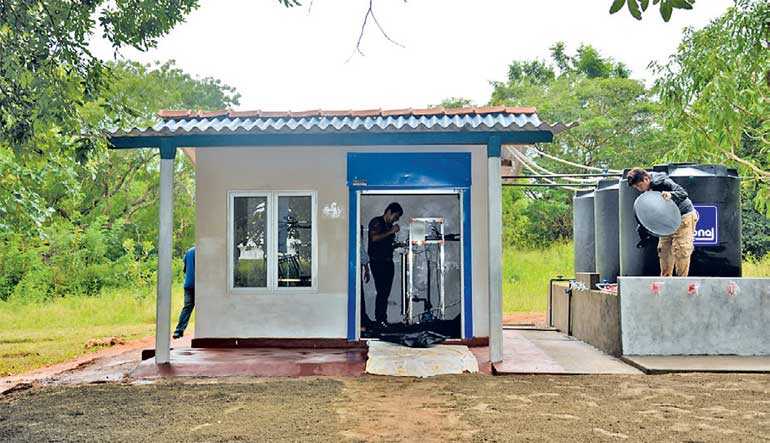
Ready to handover
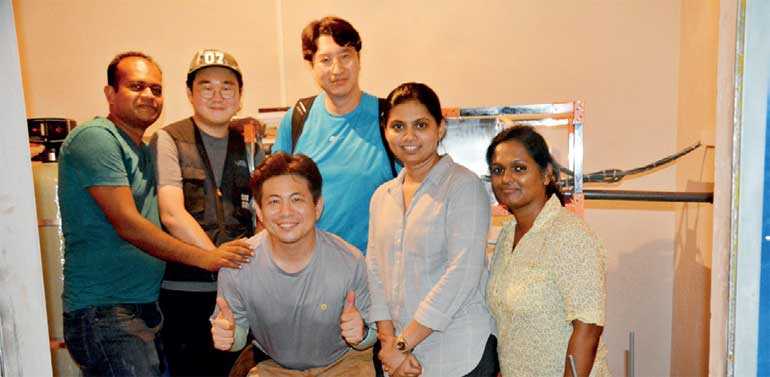
Treatment system done
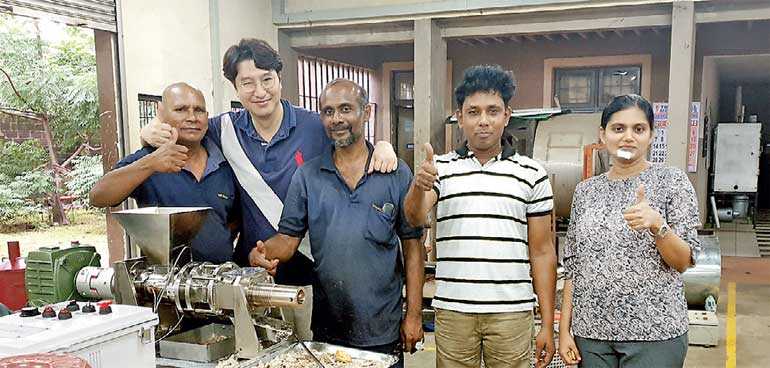
Machine ready
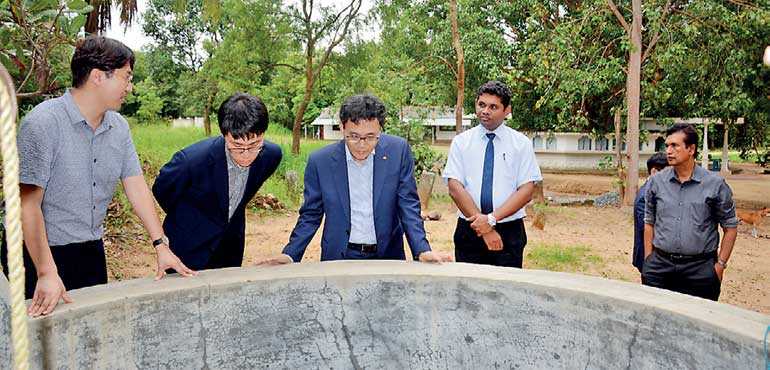
Observing the well
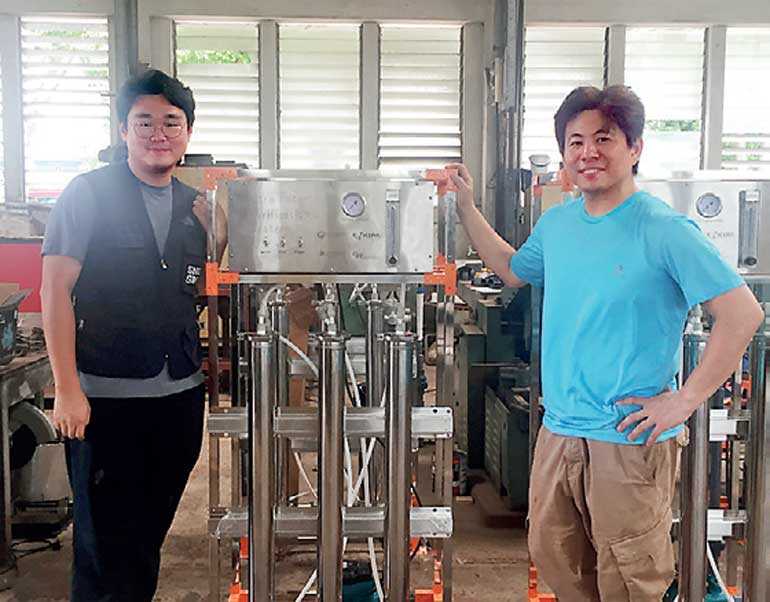
Water machine

After the handover
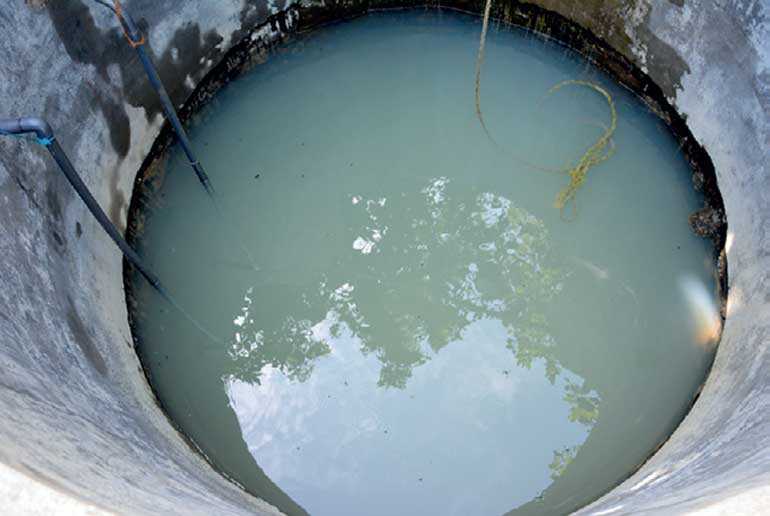
Water that was available
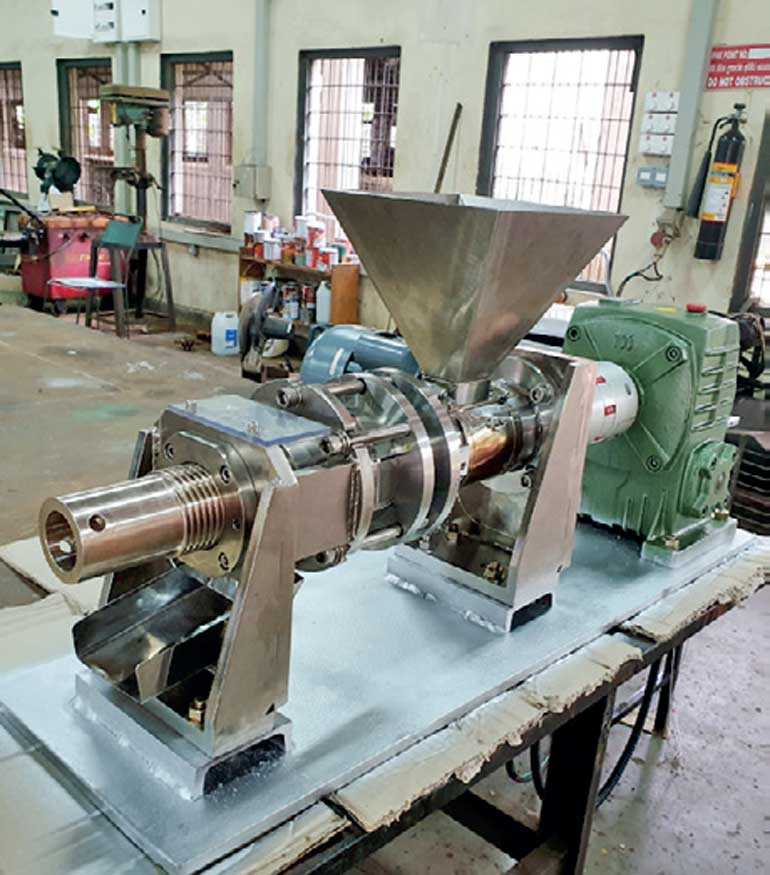
Coilex
When a team from Korea visited Sri Lanka in 2016 as part of the Intellectual Property Sharing project initiated by the Korean Intellectual Property Organization (KIPO) and the Korean Invention Promotion Association (KIPA), it was to become a journey with quite a lot of activities and learning.
The Head of Delegation Won Huijae, mentioned that the objective of this IP sharing project was to help developing countries to reach new heights and that this sponsored project is repaying a debt to the outside world when many countries rallied round to help Korea on its way up as an economically-backward developing nation after a number of wars.
Today as an economic powerhouse the Korean Head of the Delegation remarked that the country wants to reach out to help nations in similar situations. It was a remarkably candid statement and went on to indicate all the expert help subsequent to the acceptance of the project idea is totally from Korea.
Sri Lanka will only have to incur some small costs of movement and some material supplies when the Korean teams are in Sri Lanka attending to different tasks related to the project. The initial inspection visit to Sri Lanka subsequent to shortlisting of the submitted project proposals started the IP sharing project with Sri Lanka.
The final project ceremony on 10 December 2019, in the presence of the Korean Ambassador to Sri Lanka and the State Minister for Technology and Innovation, actually happened after completing three projects. It perhaps also signifies a much closer tie and friendship between multiple institutes in two countries developed over the period.
IP sharing project
IP sharing project is a global project by Korea where any interested country can apply with an idea to deploy appropriate technology. KIPA and KIPO conducts this project titled, ‘Appropriate Technology’ in order to facilitate the sustainable economic growth of developing countries. The project targets developing appropriate technologies in developing countries with financial and technical assistance by Korean government to improve the quality of life specifically in rural communities. Usually two country awards are given per year.
However, the birth of the project started much earlier and there are lessons to be learnt from that too. The project proposal originated from an IT manager of COSTI who received a training opportunity in 2015 for Intellectual Property training in Korea from the local National Intellectual Property office. The relevant officer was the person in charge of COSTI’s TISC desk, which was a project initiated by NIPO along with the World Intellectual Property Office (WIPO).
Asanka who is now with ICTA benefitted from the visit to Korea but did more from the exposure gained. He got to know the IP sharing project that had been launched by Korea and was determined to submit some proposals after returning. The COSTI TISC team eventually did just that with the submission of five projects – not just one! – after research and networking as the projects had to be based on local problems and should be amenable to be solved with appropriate technology with intellectual property involvement.
Oil recovery system
The proposal that was successful was an oil recovery system development from waste coconut residue after home and institutional use. It had been identified that in most situations 40% of oil still remains with the residue and is wasted. Some work had taken place in oil recovery with machine development especially by the NERDC and few other private sector machinery companies but some design and application issues were known. The Korean delegation at the outset was indicating multiple deficiencies in the hygienic design aspects of the machinery in use and the process.
The initial machine developed using desiccated coconut sourced from Philippines as Korea had no access to local coconut products also indicated how costly proper manufacturing of food machinery in Sri Lanka could be.
Based on design drawings shared NERDC too fabricated a machine in-house. The Korean team demonstrated an excellent development roadmap for hygienic design of equipment from materials to utilisation as well as with the potential user focus. As the Korean team designed and developed the machine without much access to coconut residue the trials took place almost on the date of opening!
The project also supported transforming the Kuliyapitiya West Vidatha Centre to be a centre for alternative technology transfer. The machine was to be propagated from this centre and NERDC to develop machines subsequently after a know-how transfer and with their own expertise included.
Another lesson to be learnt was how a small hiccup in oil expelling not to be catalogued into as a total failure – failures are very important part of learning. How officials responded to a development difficulty was instructive to state minimally. COSTI subsequently prepared an application for an after-care project, which KIPA/KIPO obliged and today the second generation machine is more suitably positioned to deliver and over a wider scope as well.
A well-developed machine is not only for one nut but can cross to different oil-bearing seeds is something to remember. What can be developed with medicinal oil is now on the development agenda with the new Coilex.
Coilex machine branding
A strong demonstration of branding was also shown when the KIPA/KIPO supported to brand the oil expeller machine as well as Ceylon Coconut as a certification mark. The Coilex machine branding has now been completed with the National Intellectual Property Office (NIPO). ‘Ceylon Coconut’ is still pending as there is approval awaited from the Presidential Secretariat. The lessons were many to those who participated in the process. A small two-member certification mark development team work diligently in the short period but starting initially from the Korean end – even sourcing ideas from the SL Buddhist clergy in Korea! 
An aspect worth mentioning is the long time taken in our paperwork operations whereas the decisive speed in which the Korean team operated once the deliverable was planned, understood and deadlines set – also in multiple locations. It was a treat to watch! No wonder the ‘Miracle of the Han River’ materialised!
In this project of coconut oil expeller, a number of institutes were coordinated by COSTI to enable the project to move forward – ITI, NERDC, CDA, NIPO and a couple of ministries.
It is another learning that even to implement a simple project with all the finances coming from outside how much networking has to be done. If procurements were to happen, seeing light would have been made much more difficult. Operational efficiencies and the ability to make decisions at different levels are something to be looked into if we are to move on the path to development.
Water purification system
COSTI encouraged by the first experience submitted two proposals plus the proposal for the aftercare project with the Coilex for 2019. Team COSTI spent time and effort in ensuring that the proposals have serious merit for consideration.
Again the efforts were rewarded when one proposal along with the aftercare project was selected for support in 2019. The project selected was to support the drinking water supply to CKDu affected communities. The scoping visit in selecting between two projects really had moved the Korean team members after seeing affected communities with CKDu.
KIPA went on to select the proposal on community-based water purification system development for CKDu affected area by considering the severity of the Chronic Kidney Disease issue and identification of the importance of supplying clean drinking water for the affected areas. There was the genuine intention of helping a community with technology. Selecting locations to place treatment plants were done in consultation with the Water Board.
After evaluating the research publications on water quality analysis on CKDU affected areas and considering the limited time line of the project, Korean Tech expert suggested a stage wise membrane filter purification system. However, it also identified the red clay technology developed by Industrial Technology Institute, Sri Lanka as a validated local resource for water purification in CKDu detected areas. Hence the project was finalised to combine ITI red clay technology with membrane filtration system on a purification skid.
Under the project, one membrane (RO) Plant with the capacity of 10,000L/d at Padikaramaduwa, Galenbindunuwewa, one Ultra Filtration (UF) Plant with the capacity of 5000L/d at Giranegama, Palagala and another Ultra Filtration (UF) Plant with the capacity of 5000L/d at Wijayakatupotha, were finalised. The Korean tech team designed so that the whole treatment operation is skid mounted making mobile treatment systems a possibility. It must be added here that the analytical results for water was interesting and as such the stage wise scheme had more justification.
COSTI again led by Bhagya and Navodhi teamed up with CKDu taskforce in the Presidential Secretariat, CKDu Project unit of National Water Supply & Drainage Board (NWSDB), North Central Province and Sri Lanka Navy to implement the project in Sri Lanka. Another extended list of coordination. Water purification design was verified and approved by the NWSDB. The plant house construction, maintenance and operations of the purification skids finally would be managed by the NWSDB and SL Navy.
Technology transfer and shared knowledge
The IP sharing project is all about technology transfer and enabling local institutes and resource personnel to continue benefitting from the shared knowledge.
|
Coilex and Ceylon Coconut |
The first water purification plant developed under the project, the Ultra Filtration (UF) Plant located at Giranegama, Palagala was completed and handed over to the village community on 9 December 2019 in the presence of Korean delegation of KIPO and KIPA. The plant planned at Galenbindunuwewa and Arachchikattuwa are still under construction. The NWSDB and SL Navy will complete construction, installation and commission of the reminder before March this year.
When seeing the water that was initially available and the final treated water that started flowing out from the unit it is easy to value the smiles on the faces of the recipients. The villagers were quite grateful and the perfect scenic beauty in the locality today supports the community to drink peacefully as well. Good quality water is one sure way for a healthy life and this gift from KIPA/KIPO which also embedded ITI technology was definitely a boon to this community and for two more communities to come.
It must be indicated finally the admirable work ethics of all the team members from Korea and their sincere commitment to deliver. When we had only problems to present over simple issues such as documents are not ready or more decisions are necessary they still stuck to their original schedule and delivered. Putting smiles on four communities and with the potential to liven up many more I am sure that they consider the efforts really worthwhile as they observed first-hand the potential of what they have delivered at ground level.
For us at Team COSTI, it was also a reward for our efforts in moving ahead against so much barriers. Actually seeing something positive happening at different ground zeroes is indeed worthwhile. Thanks to KIPA and KIPO we are stronger today too.